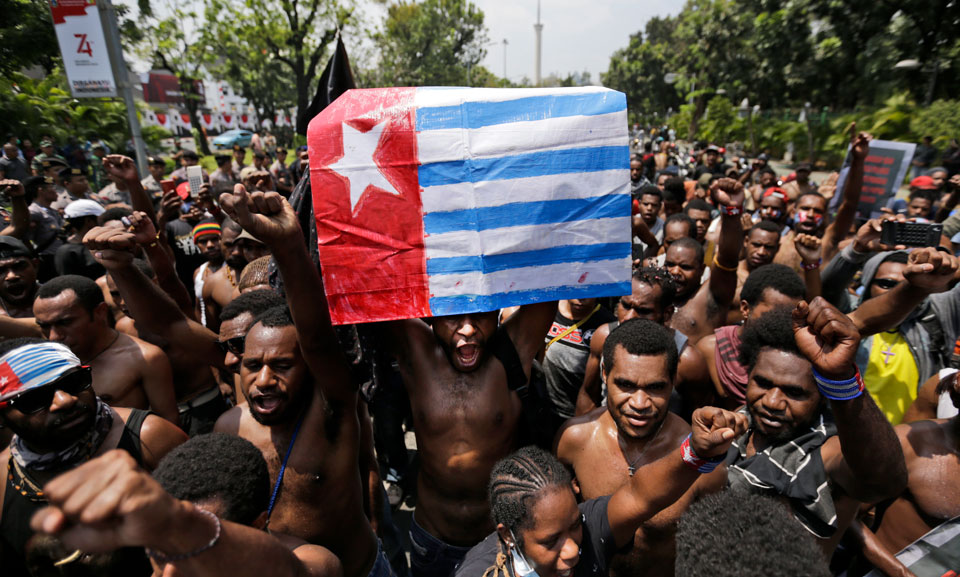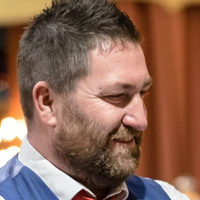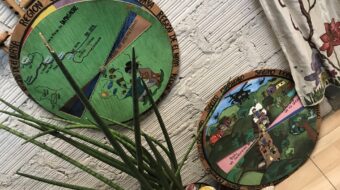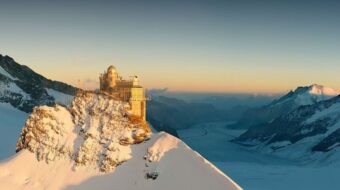
This article was first published in Morning Star on Jan. 29, 2021.
It has been an incredible journey for exiled West Papuan leader Benny Wenda.
From a childhood spent living in poverty in the mountains where he witnessed his auntie being raped by Indonesian soldiers to a daring escape from prison in 2002, his “long walk to freedom” culminated in his election as the territory’s interim president as part of a government-in-waiting in a historic vote on Dec. 1, 2020—West Papua’s national day.
Our conversation takes place over WhatsApp—coronavirus means we cannot meet at his Oxford home where he has lived since being granted political asylum in 2003.
Before we proceed with the interview, he tells me that the Morning Star “is the media of West Papua,” laughing as he explains that our articles are shared all over social media and in WhatsApp groups.
To explain—the Morning Star is also the name of the West Papuan flag, its display partially banned by the occupying Indonesian authorities, with scores jailed for raising it during the 2019 uprising, which was triggered by racist taunts of West Papuans by police on the university campus.
It was first raised in December 1961 after the liberation from Dutch colonialism, but before the territory came under the administration of the United Nations in October 1962.
Under the country’s Special Autonomy Law, which expires later this year, the flag can be raised as long as the flag of Indonesia is raised at the same time and it is higher than the Morning Star.
In practice, Indonesian forces see the Morning Star as a symbol of West Papuan independence—a cause that Wenda says the movement is coming close to realizing—and those who display it are harshly punished. One day, the Morning Star will be raised in a free and independent West Papua, Wenda hopes, saying his people have been crying out for support for more than 50 years.
A life lived under occupation

The West Papuan leader explains that his own personal journey is symbolic of that of the West Papuan people.
They have lived under Indonesian occupation since the 1969 so-called Act of Free Choice, Wenda explains, in which just over 1,000 residents—including his own father—were forced at gunpoint to ratify the annexation of their land by Jakarta.
Some 500,000 people, mainly West Papuans, have been killed since then, which Wenda and others say is a genocide which has been ignored and even perpetuated, by world powers.
“When I was a child, I wasn’t aware of the wider world, even outside of my own community in the Central Highlands,” Wenda tells me as he explains how he became involved in the liberation movement.
“I didn’t know there were other people out there. I thought it was just my clan, my tribe, and my mum, dad, auntie, and uncle,” he continues. “But suddenly we were surrounded by the Indonesian military.”
Wenda was born in 1974 in the Baliem Valley, some five years after the formal annexation of West Papua, officially a province of Indonesia that sits on the western peninsula of the island of New Guinea. Three years later, major operations were carried out by the Indonesian military in a bid to quell the nascent independence movement and a rebellion by his tribe, the Lani.
“They [Indonesian soldiers] were carrying out searches. I didn’t understand why,” Wenda tells me. “We were just living peacefully, in harmony with our nature. I was only going to the garden with my parents. But one time I went beyond the mountains with my auntie and my mum, and we were confronted by the military.”
He proceeds to describe the harrowing story of how the soldiers first racially abused his mother and then raped his auntie in front of his eyes. He was just five years old.
“My mum was screaming but I couldn’t do anything. We had to hide in a bush. This is my childhood memory,” he says, saying that he believes his auntie died because of the trauma. Wenda himself was injured during Indonesian bombing raids, impairing his growth. Many of his family members were killed.
The Indonesian attacks caused mass displacement, with Wenda saying that he and his family became refugees, hiding in the jungle. It is a practice that continues today with thousands driven from their homes and taking shelter in the mountains.
But even there they are not safe. Indonesian planes frequently strafe their hideouts and have been accused of dropping chemicals onto the West Papuan civilians who have taken refuge there.
Wenda said the racism that triggered the 2019 uprising is systemic and ingrained into Indonesians from a young age. West Papuans are Melanesian and many identify as black. His experience in school was typical of that of his fellow West Papuans, although as a child he didn’t understand it.
“I was in primary school and a girl told me that I smelled, so the next day I scrubbed and washed my body to make sure I was clean. I went into the same class the next day, and she looked at me and then spat in my face. But I stood up for myself and banged the table and said: ‘Yes, I am black. But I am a human being just like everybody else’.”
This defiant stance was to continue when the future West Papuan leader went to university to study politics. But he soon found that he ran into difficulties when he questioned the nature of the relationship between Indonesia and West Papua.
He spent long periods in the library trying to find out how his homeland became part of Indonesia. Wenda says he was puzzled, as “we wear clothes like them, we dress like them,” but they would attack us just for being different.
In classes, he began to question why West Papua wasn’t an independent nation allowed to govern itself or allowed to make decisions that benefited its own people. “I became suspicious,” he explains, “But my lecturers kept saying to me: ‘Benny, I think you need to be careful with that subject’ and I was curious why.”
The legacy of imperialism and anti-communism
Of course, the answer is deeply rooted in imperialism. The Dutch had always argued that West Papua was ethnically different from the rest of its former colonies in the Dutch East Indies and believed it shouldn’t form part of the new Indonesian nation.
But the U.S. had other ideas. It was the height of the Cold War, and President John F. Kennedy wanted to ensure that his Indonesian counterpart, General Sukarno, came under Washington’s influence. The rights and lives of the West Papuans were an irrelevance.
Sukarno was acutely aware of the geopolitics and agreed to aid from the Soviet Union as he established the new Indonesian nation in order to gain U.S. support in his bid to crush political opponents. Trying to play both sides, he maneuvered the U.S. and its junior partner Australia into backing his takeover of West Papua.
Arrests of Papuans who spoke out started soon after, and the oppression led to the start of the armed struggle, which saw auxiliary units clash with Indonesian troops. But early success was short-lived, and UN forces soon left and the West Papuans were abandoned.
In 1965, the U.S. was tied up in the Vietnam War. But the U.S. used its links through the military and backed a coup led by General Suharto on the pretext of restoring security. With the full support of the U.S., the new regime destroyed the Indonesian Communist Party.
The CIA handed over an extensive list of Communists and other leftists, including trade unionists, who were to be targeted and wiped out.
It is estimated that somewhere between 500,000 and three million people were killed in the ensuing bloodshed. Emboldened by the support from the U.S., Suharto moved his attention to West Papua, knowing that his plans wouldn’t be opposed.
Military operations included the aerial bombardment by helicopters and troops on the ground, going into areas that had never had contact with Indonesians previously, including Wenda’s Highland home. Some 500,000 have been killed in violent acts of oppression that continue today.
Leader of the West Papuan liberation struggle
Wenda was elected as a leader of the West Papuan people after leaving university, he explains, first of his tribe, the Lani people, and then as the secretary-general of the Demmak tribal assembly.
It is a dangerous position to hold. A number of leading figures in the West Papuan liberation movement have been killed, including Theys Eluay, who was brutally murdered by Indonesian security services in 2001. Wenda himself is subjected to regular death threats.
In 2002, Wenda was arrested and jailed after leading a march for independence. But he managed to escape from prison and make his way to Papua New Guinea. From there, with the help of an NGO, he made his way to Europe and eventually Oxford where he now lives with his family.
Of course, there are other interests that stand in the way of West Papua’s bid for independence from Jakarta. It is home to the world’s largest gold and copper mine, run by a subsidiary of the U.S. firm Freeport-McMoran.
The Anglo-U.S. oil giant BP is developing a massive natural gas field in West Papua which is expected to be generating revenues of around £55 million ($75 million USD) a year.
“We’ve been sacrificed for the interests of big mining companies and others,” Wenda tells me. “West Papua has so many natural resources, it’s the richest place on the planet. This is why BP and Rio Tinto want to exploit our lands. But they are, of course, directly or indirectly supporting Indonesia, because they’re paying a big amount of tax that is using to buy weapons to use against my people.”
He explains that the mining companies have never asked for permission to operate in West Papua, and it is a situation he says must be addressed.
Whole swathes of West Papua are being deliberately depopulated by Indonesia where it sees economic opportunities, with villages being burned to the ground.
The attacks have been met with resistance. The United Liberation Movement for West Papua (ULMWP) has a military wing, the West Papuan Army, which Indonesia brands a terrorist group in a bid to smear the independence movement.
But, Wenda says, “the world should not be fooled by this.” He explains that his people have lived on their land for tens of thousands of years and before Indonesian forces arrived, there were no mass killings or pollution.
Now West Papua has become a hunting ground for the Indonesian army, he says.
“The mining companies need to be accountable to us, to our forests, to our mountains, to our rivers,” Wenda says, as he declares that West Papua will be “the first green state in the world” after independence.
This is something the West Papuan leader believes is coming with the election of a government-in-waiting in December 2020, with Wenda as interim president—a significant step towards making this a reality.

Indonesia reacted with horror at the announcement, which was carried in major newspapers across the world, a rarity when it comes to international coverage of the West Papuan freedom movement.
But Indonesian President Joko Widodo has ignored appeals for negotiations with Wenda, refusing to recognize the provisional government and describing it as “a farce” while continuing to deny the aspirations of the West Papuan people and their “inalienable right to self-determination.”
Instead, Wenda says, the Indonesian government has escalated the killings, jailing, and oppression of West Papuans, threatening those who support the so-called government-in-waiting.
His six-point plan, which includes a map to peace and independence from Indonesia’s illegal martial law in West Papua, has been met with silence from Jakarta, but Wenda insists that the declaration on Dec. 1 is evidence of a “legitimate governance structure capable of running our own country.”
Support is growing among the international community, with former colonial rulers the Netherlands becoming the 83rd country to add its voice to those calling for Indonesia to allow the UN High Commissioner for Human Rights to be allowed into West Papua.
The Dutch also acknowledged a petition signed by half-a-million people opposing the renewal of the Special Autonomy Law, calling for a referendum on independence.
But Indonesia continues to block access to West Papua to the UN, NGOs, and journalists, as Wenda says it doesn’t want the world to see the crimes being committed against his people.
He described what is happening to his people as “nothing short of ethnic cleansing. They are systematically wiping us out.” Wenda says more than 500,000 West Papuans have been killed since the 1969 annexation.
“It’s a slow-motion genocide,” he says.
But he continues to dream and insists that one day his people will be free. Until then, he urged readers to continue to “raise the voice of the voiceless” and support the people of West Papua.
Morning Star












Comments